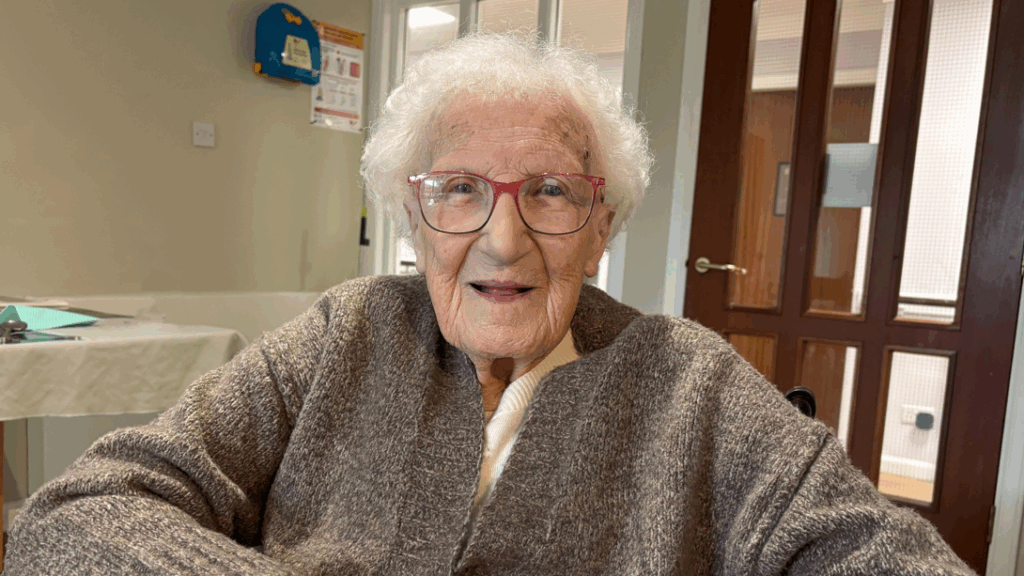
“I never thought I’d make it to this age,” says May O’Shea, who recently celebrated her 100th birthday. “I thought I would have died by now.” Despite her surprise, May joins a growing number of centenarians in the UK, a demographic that has doubled over the past two decades.
According to the latest figures from the Office of National Statistics (ONS), there were an estimated 16,650 people aged 100 or above living in the UK in 2024, marking a record high. In Scotland, where May resides, the number of centenarians has reached 1,000 for the first time, though it remains an age achieved by only one in every 5,000 people.
May’s Journey Through a Century
Born in Port Glasgow in 1925, May O’Shea reflects on her century-long journey with a sense of wonder. “I don’t feel 100, I feel much younger. I look at my hands and I’m shocked,” she admits. Her life has been marked by significant historical events, including surviving a German blitz on Port Glasgow during World War II, which she vividly recalls: “You could see all the flames in the sky, it looked like a sunset.”
Post-war, May moved to London, where she worked as a cleaner, including a stint with the iconic 80s band, Depeche Mode. She later returned to Scotland, where she became a mother, grandmother, and great-grandmother. Her son Jim, now 70, delivers two newspapers to her daily, a routine she credits with keeping her mind sharp.
When asked about the secret to her longevity, May attributes it to a life free from smoking and drinking, advising others to “just take care of themselves and don’t overdo it!”
The Science Behind Longevity
Paul Shiels, a professor of geroscience at the University of Glasgow, explains the rise in centenarians as a result of improved living conditions, nutrition, and public health. “Over the last century, we’ve seen advances in medicine, better detection of disease, better disease treatment, more widespread use of vaccinations, and the appearance of antibiotics,” he notes.
“These are really enabling people who would’ve died at a younger age to live longer,” says Prof Shiels.
The ONS statistics reveal that women constitute more than 80% of those reaching 100, though the number of men achieving this milestone is increasing. Two decades ago, men accounted for 10.9% of centenarians, a figure that has now risen to 18.4%.
“Women age better than men,” Prof Shiels explains. “They handle psychosocial stress a lot better and tend to be more social.”
He speculates that while the number of women reaching 100 may have plateaued, men are catching up. “It may be that we’ll see a further small increase in the number of people reaching 100 over the next few decades, but I don’t think it will be dramatic.”
Personal Stories of Longevity
For 104-year-old Mary Smith, good genes play a crucial role in her long life. Born in Korea in 1921 to British parents, Mary traveled the world with the Navy. Her favorite memory remains the end of World War II, a moment she experienced while crossing the Atlantic Ocean.
Mary attributes her longevity to her “tough ancestors” and remains active, never missing a gym class at her care home in Edinburgh. “They keep me fit and keep me moving, stop me stiffening up – I’m very determined, I won’t give up,” she declares.
Jean Aitken, another centenarian from Port Glasgow, shares her own secrets to a long life. “I’ve never been sporty, but all my life I’ve always done a lot of Scottish country dancing,” she says. Jean also highlights her avoidance of milk and her positive outlook, as described by her great-niece Stephanie Bell.
Expert Advice on Reaching 100
While genetics play a role, Prof Shiels emphasizes the importance of environmental factors in achieving longevity. “We’re still finding out lots more about what really causes how we age, and the big surprise is that your environment is probably more of an influence on your age and age-related health than your genetics.”
“If more of us want to live to 100, we have to change our environment and we have to modify our lifestyle,” Prof Shiels advises.
He suggests that balance, moderation, and social engagement are key components of a long life, cautioning against the allure of quick fixes. “In the real world, you need balance. Cutting stress, doing things in moderation, and being social – these are the best ways to get near 100.”
As centenarians like May, Mary, and Jean continue to share their stories, they offer invaluable insights into the art of living well into the triple digits, inspiring future generations to follow in their footsteps.






